
Steve Jackson Games (SJGames) is a game company, founded in 1980 by Steve Jackson, that creates and publishes role-playing, board, and card games, and the gaming magazine Pyramid.
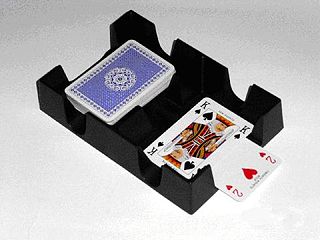
Canasta is a card game of the rummy family of games believed to be a variant of 500 Rum. Although many variations exist for two, three, five or six players, it is most commonly played by four in two partnerships with two standard decks of cards. Players attempt to make melds of seven cards of the same rank and "go out" by playing all cards in their hands. It is "the most recent card game to have achieved worldwide status as a classic".

Shithead is a card game, the object of which is to lose all of one's playing cards, with the final player being the "shithead". The game became popular among backpackers in the late 20th century. Although the basic structure of the game generally remains constant, there are regional variations to the game's original rules.

500 rum, also called pinochle rummy, Michigan rummy, Persian rummy, rummy 500 or 500 rummy, is a popular variant of rummy. The game of canasta and several other games are believed to have developed from this popular form of rummy. The distinctive feature of 500 rum is that each player scores the value of the sets or cards they meld. It may be played by 2 to 8 players, but it is best for 3 to 5.

Wyatt Earp is a rummy-like card game first released in 2001. The game is named after Wyatt Earp, a famous lawman, and is set in the American Old West. It is manufactured by Rio Grande Games and was created by Mike Fitzgerald and Richard Borg for Alea.
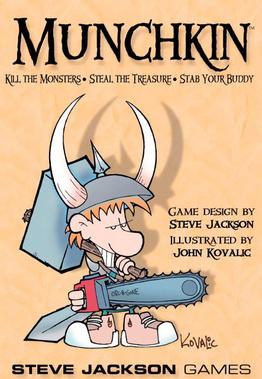
Munchkin is a dedicated deck card game by Steve Jackson Games, written by Steve Jackson and illustrated by John Kovalic. It is a humorous take on role-playing games, based on the concept of munchkins.

El Grande is a German-style board game for 2-5 players, designed by Wolfgang Kramer and Richard Ulrich, and published in 1995 by Hans im Glück in German, by Rio Grande Games in English, and by 999 Games in Dutch. The game board represents renaissance-era Spain where the nobility fight for control of the nine regions. El Grande was praised for its area-control mechanism, and was awarded the Spiel des Jahres prize and the Deutscher Spiele Preis in 1996. Following its release, several expansions and an alternative version were published.
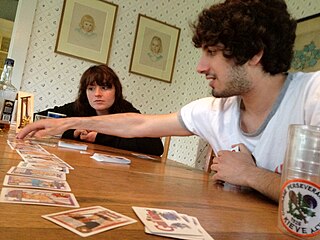
Guillotine is a card game created by Wizards of the Coast and designed by Paul Peterson. The game is set during the French Revolution, and was released on Bastille Day in 1998. The goal is to collect the heads of Nobles, accumulating points. Despite the grim topic of the game, the artwork is comical and the tone light.

Golf is a card game where players try to earn the lowest number of points over the course of nine deals.

Bang! is a Spaghetti Western-themed social deduction card game designed by Emiliano Sciarra and released by Italian publisher DV Giochi in 2002. In 2004, Bang! won the Origins Award for Best Traditional Card Game of 2003 and Best Graphic Design of a Card Game or Expansion.
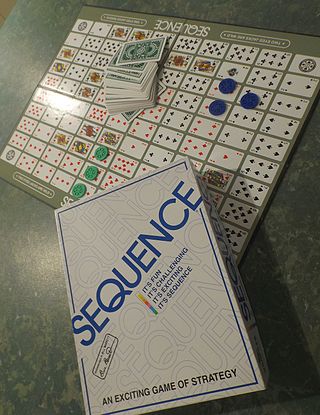
Sequence is an abstract strategy board-and-card game. Sequence was invented by Doug Reuter. He originally called the game Sequence Five. He spent years developing the concept, and, in June 1981, granted Jax Ltd. an exclusive license to manufacture, distribute and sell the board game Sequence and its subsequent variations. The game was first sold in a retail store in 1982. In 2017, Goliath Game Company bought Jax, and in early 2018 also bought all licensor rights and now owns 100% of the game Sequence. Doug Reuter is acknowledged as the inventor of Sequence on all newly produced copies of the game - both on the box and in the printed rules.

John Kovalic is an American cartoonist, illustrator, and writer.
Yaniv, also known as Jhyap, Jafar or aa’niv, is a Nepalese card game popular in Israel. It is a draw and discard game in which players discard before drawing a new card and attempt to have the lowest value of cards in hand. The game is considered a backpackers game in Israel, and it's popular among soldiers and young adults returning from long backpacking trips.
Civilization: The Card Game is a card game designed by Civilization IV lead designer Soren Johnson, based on Civilization IV. It was developed in 2006 by Firaxis Games, as a bonus in the Sid Meier's Civilization Chronicles boxed set, and is not available independently.
Gloom is a tabletop card game created by designer Keith Baker and published by Atlas Games in 2004. It won the Origins Award for Best Traditional Card Game in 2005. Four expansion packs have been created since the release of the original game called, Unhappy Homes, Unwelcome Guests, Unquiet Dead and Unfortunate Expeditions. Additionally, In August 2011, Cthulhu Gloom, which serves as either a standalone game or a fifth expansion pack, was released, and one Cthulhu expansion pack has been released, called Unpleasant Dreams.
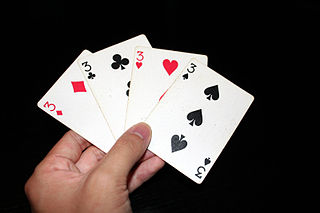
Kalooki or Kaluki, is a version of Contract rummy popular in Jamaica, and it has become known as Jamaican Rummy. A version called "Super Kalooki" is played in tournaments, while a version called "Baby Kalooki" is often played with children or for purposes of teaching the game. There are a few variations of the game described in books and on the internet. A similar game is sometimes referred to as "Kalooki 40".

Cabo is a 2010 card game by Melissa Limes and Mandy Henning that involves memory and manipulation. The game uses a dedicated deck of cards with each suit numbered from 0 to 13, and certain numbers being marked as "Peek", "Spy" or "Swap". The objective of the game is for each player to minimize the sum of their cards, four of which are played face-down to the table at the start of a round. Face-down cards may be revealed and swapped by card effects.
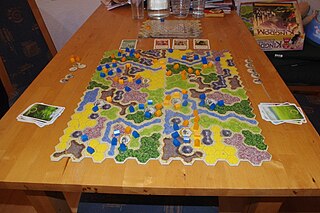
Kingdom Builder is a strategy board game designed by Donald X. Vaccarino, published in 2011 by Queen Games with illustrations by Oliver Schlemmer in German, British and international versions.

Star Realms is a card-based deck building science-fiction tabletop game, designed by Rob Dougherty and Darwin Kastle and published in 2014 by White Wizard Games. The game started out as a Kickstarter campaign in 2013. The goal of Star Realms is to destroy opponents by purchasing cards using "trade" points and using these cards to attack an opponent's "authority" using "combat" points. The game takes place in a distant future where different races compete to gain resources, trade and outmaneuver each other in a race to become ruler of the galaxy.
Castle Panic is a board game designed by Justin De Witt and published by Fireside Games in 2009 Castle Panic is a tower defense strategy game in which players work cooperatively to protect a castle from monsters. The game was a nominee for the 2010 Golden Geek Best Family Board Game.
















